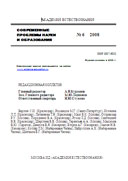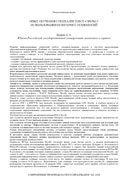PDF-версия статьи


|
The focus is on the effectiveness of ICT integration in education. This article aims to determine the level of computer skills and knowledge of primary school teachers in the field of teaching and learning processing. In addition, the purpose of this article is to determine the level of Integration of ICT in the process of teaching and learning.
The results show that teachers should always be prepared and well equipped in terms of ICT competence and positive attitudes towards ICT-based learning opportunities for students to improve the quality of learning. Future research should consider other aspects of ICT integration, a managerial point of view, such as strategic planning and manufacturing policies.[1]
Information and communication technologies (ICT) have passed through innovations and transformed our society, which has completely changed the way people think, work and live.
As part of this, schools and other educational institutions that must prepare students to live in a “knowledge society” need to take into account the integration of ICT in their curriculum. Combined with preparing students for the current digital era, teachers are seen as key players in the use of ICT in their daily classes. This is due to the ICT capabilities in providing a dynamic and active learning and educational environment. There is no doubt that technology in this modern society is being used increasingly, especially for the purpose of learning. This is due to the fact that modern technology offers many tools that can be used in classrooms to improve the quality of education.
In addition, ICTs have the potential to prepare students for life in the 21st century. Through training in ICT skills, students are ready to solve future problems based on correct understanding. Scientists believe that using ICT can help students develop the competencies necessary for current globalization. This is because ICT can help students develop their skills, increase motivation and expand their knowledge. In accordance with globalization and information highways, the education system is planned to train students in the future workforce who possess technological, innovative and familiar technical know-how.
This should allow the nation to be creative and competitive for the current globalization. Therefore, the need for an effective ICT-based curriculum is one of the main elements of strategic planning for the integration of ICT into the education system. This will ensure the optimization of technological investment decisions in the education system. The integration of technology in education is a complex task due to its dynamic nature. Therefore, planning for the integration of ICT in education is considered a key element of improvement and development.[2]
Previous studies show that due to the problems associated with the use of educational technology in the education system, the integration and implementation of ICT is a complex process that requires strategic planning by policy makers and decision makers. Integration of ICT in education Information and communication technologies (ICT) have become the most basic modern industrial society in a very short time. Mastering information technology and understanding basic ICT skills and concepts is now highly valued by many countries.
ICT is growing at an amazing pace in teacher training. The need for ICT development is a global resolution and is of great importance to all mankind. These technologies have become central to modern societies.
Information and communication technology is an abbreviation for computers, software, networks, satellite channels, and related systems that allow people to access, analyze, create, share, and use data, information, and knowledge in ways they could imagine.
The prevalence and rapid development of ICT has transformed human society from the era of information technology to the age of knowledge. The following competencies required by lecturers in the use of ICT in teaching education have been determined.[3]
These include:
- competence in personal use of
ОПУБЛИКОВАНО
U.M.Izbaeva.- teacher of the highest category., L.T.Tuymebekova - magister, senior teacher., O.Sh. Esmahanova – magister, senior teacher., K.N. Myrzaseytova - magister, senior teacher., A.N. Myrzaseytova - magister, senior teacher. FORMING THE INFORMATION AND COMMUNICATIVE ENVIRONMENT IN THE EDUCATIONAL PROCESS. // Современные проблемы науки и образования - 2019.-№6. (приложение "Педагогические науки"). - C. 3